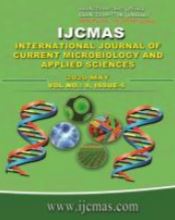


 National Academy of Agricultural Sciences (NAAS)
National Academy of Agricultural Sciences (NAAS)

|
PRINT ISSN : 2319-7692
Online ISSN : 2319-7706 Issues : 12 per year Publisher : Excellent Publishers Email : editorijcmas@gmail.com / submit@ijcmas.com Editor-in-chief: Dr.M.Prakash Index Copernicus ICV 2018: 95.39 NAAS RATING 2020: 5.38 |
Selenium is an essential nutritional trace element having vital role in immunoprotection, antioxidant defence system, muscle metabolism, growth and reproduction. Hence dietary selenium supplementation in the poultry has been regularly practiced using the inorganic and organic forms. These forms have the limitations of having narrow margin of safety and non specific binding to tissue proteins, hence an alternate form of selenium i.e. nano selenium having greater potential as poultry and livestock feed supplement with higher bioavailability, higher margin of safety and seven fold lower acute toxicity was prepared using starch, ascorbic acid and bovine serum albumin. The nanoselenium (15-40 nm) synthesized were characterized by XRD analysis, transmission electron microscopy and UV spectrophotometry. This nanoselenium was used for the biological trial in broiler chickens owing to simplicity and easy adaptability for large scale production. The treatment groups were supplemented with 0.3 mg/kg sodium selenite (T2), 0.3 mg/kg organic selenium (T3), nanoselenium at three levels viz.0.15 (T4), and 0.3 (T5) and 0.6 mg/kg (T6) and T1 group was the control, fed with the basal diet alone. The weekly body weight of individual bird was recorded upto the end of sixth week. The mean body weight gain (g) recorded at the end of 6th week were 2050.35, 2108.40, 2117.58, 2136.50 and 2141.65 for the groups T2 to T6, respectively when compared to 2030.60 of T1 group. The mean body weight gain at the end of 6th week was higher (p<0.05) in the organic and nanoselenium supplemented groups compared to control. All the nanoselenium supplemented groups (T4, T5 and T6) showed significantly higher (p<0.05) body weight gain than T1 from 4th week onwards. The T5 and T6 groups supplemented with nanoselenium at 0.3 mg/kg and 0.6 mg/kg showed significantly (p<0.05) increased body weight gain than the groups T1, T2, T3 and T4. The mean body weight gain of T3 did not differ from T4. Hence supplementing the nanoselenium (0.3 – 0.6mg/kg diet) resulted in increased body weight in broiler chickens with minimal risk of toxicity and better bioavailability.
 |
 |
 |
 |
 |